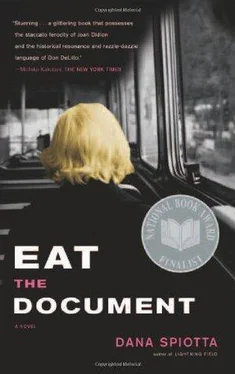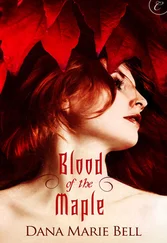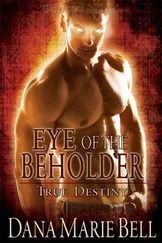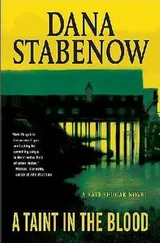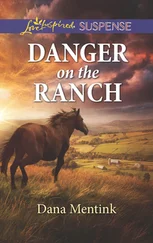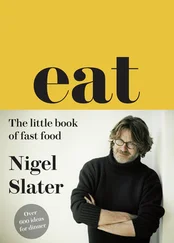Dana Spiotta - Eat the Document
Здесь есть возможность читать онлайн «Dana Spiotta - Eat the Document» весь текст электронной книги совершенно бесплатно (целиком полную версию без сокращений). В некоторых случаях можно слушать аудио, скачать через торрент в формате fb2 и присутствует краткое содержание. Год выпуска: 2006, Издательство: Scribner, Жанр: Современная проза, на английском языке. Описание произведения, (предисловие) а так же отзывы посетителей доступны на портале библиотеки ЛибКат.
- Название:Eat the Document
- Автор:
- Издательство:Scribner
- Жанр:
- Год:2006
- ISBN:нет данных
- Рейтинг книги:3 / 5. Голосов: 1
-
Избранное:Добавить в избранное
- Отзывы:
-
Ваша оценка:
- 60
- 1
- 2
- 3
- 4
- 5
Eat the Document: краткое содержание, описание и аннотация
Предлагаем к чтению аннотацию, описание, краткое содержание или предисловие (зависит от того, что написал сам автор книги «Eat the Document»). Если вы не нашли необходимую информацию о книге — напишите в комментариях, мы постараемся отыскать её.
shifts between the underground movement of the 1970s and the echoes and consequences of that movement in the 1990s. A National Book Award finalist,
is a riveting portrait of two eras and one of the most provocative and compelling novels of recent years.
Eat the Document — читать онлайн бесплатно полную книгу (весь текст) целиком
Ниже представлен текст книги, разбитый по страницам. Система сохранения места последней прочитанной страницы, позволяет с удобством читать онлайн бесплатно книгу «Eat the Document», без необходимости каждый раз заново искать на чём Вы остановились. Поставьте закладку, и сможете в любой момент перейти на страницу, на которой закончили чтение.
Интервал:
Закладка:
Okay, it was about eight o’clock, and by this time in the evening — I’ve noticed this, really all the time and without really intending to notice — by this time she was a little drunk. I knew this because I occasionally go to the living room to watch TV. Or I go to the dining room to eat dinner with her. She does this thing where she pours like a third of a glass of white wine and then she pours club soda into the glass to top it off. A wine spritzer, I guess. A corny suburban housewife kind of drink. She thinks it’s a light aperitif, I imagine. You might call it that, an aperitif, if you wanted to make it sound reasonable and almost medicinal. Thing is, she soon finishes and then does the third of a glass and spritzer routine again. Thing is, she does this all evening long. It’s not like I’m counting or even really paying attention, but it is hard to miss when she does this all evening long, every evening. I’m not even saying there is anything wrong with it. She never seems drunk — she doesn’t get all slurry or drop things. She just seems increasingly placid and a bit dulled by bedtime. She is already the sort of person who seems constantly to be halfway elsewhere. So this habit only makes her more and more absent or indifferent to the vagaries or boredom of being in this house. I’m not judging here but merely describing what it is she does. I am just observing her. I think maybe the whole third of a glass plus seltzer thing indicates she isn’t quite admitting to herself how much she drinks, but surely at some point she goes to refill and she realizes she’s down to the last third of a glass in the bottle (and we are sometimes talking a magnum here, a big economy jug) that started the evening full, and she must realize, then, that she is drinking quite a lot. But by then she must also be placid enough, plied enough, by the countless spritzers where perhaps this empty magnum doesn’t weigh on her too much at all. She is by then, well, whoever she is, in her private, silent thoughts, and I don’t really mind as long as she doesn’t interfere with me, which she usually doesn’t.
So she was feeling no doubt buzzed by eight o’clock, and this song caught her as she walked down the hall. She was lost in it, faintly smiling. She looked really young standing there listening, and sort of uncovered, which was unusual for my mother. She is generally so creepily guarded and cryptic in odd, sunny ways. Like she isn’t really entirely sure she is in the right house or the right life. Like she’s a guest here. I guess she lacks the kind of certainty one expects in a parent. She seems to lack the necessary confidence. The song ended, there were a few seconds of silence and then “Our Prayer,” take number eight, kicked in. During the break she smiled at me — a flirty, sheepish smile, disarmingly unmomlike.
“Great song,” she said. Then it began again, and I lowered it reluctantly.
“A teenage symphony to God,” I said, quoting the liner notes that quoted Brian Wilson.
“Yes, that’s right,” she said, nodding. “They always sound most like that when there aren’t any words. When they use their voices as instruments. Just pure, perfect form.”
So she said this kind of smart thing about the Beach Boys and then wandered off to refill her glass or something. That’s the first time I remember thinking, How can that be?
Antiology
NASH HAD SEEN it happen before — many times, in fact. He stared at the kid’s racing-striped, voluminous nylon messenger bag. Nash recognized the carrier of the bag. Davey D., maybe, if he remembered correctly. D. had that long, snaggly-ass surfer hair, bleached and knotted. He had a habit of pulling at the knots, tearing his fingers through them, then discarding the clumped strands on the floor. And when he took off his knit skullcap, the blond and knotted hair sprouted up and out like a palm frond over his forehead. Nash stood next to the cash register and watched Davey D. shove a skateboarder magazine into his bag. Who gave a crap except it was one of those Japanese imported skateboarder magazines that came wrapped in plastic and sold for fifteen bucks, with a CD sealed inside. Davey D. just eased it into the bag, slid it from magazine stand to flap compartment. No hesitation. No look around.
Nash didn’t do anything. He watched D. but berated himself: why have a fifteen-dollar skateboarder magazine for sale at all? Sealed so it can’t even be flipped through before you shelled out your fifteen bucks. Could there exist a more appropriate or likely object for shoplifting? But this was Nash’s problem, or one of them. He felt waves of ambivalence about shoplifting, and usually at crucial moments.
That didn’t mean it didn’t upset him. He stared at that shoulder bag, at Davey D. as he continued wandering the store. Nash felt increasingly angry over it, in fact. What upset him (probably) was his sense that Davey D. was certainly one of those rich-raggedy kids. They looked poor, they acted poor, they smelled poor — but somewhere behind them or out ahead of them, somewhere in the surround of them, lurked big, ungainly scads of unearned money. Big Connecticut or Rhode Island Grandpappy dough. The more snaggly the hair, the worse the hygiene, the older the money. Nash didn’t know for sure, but he had developed what he felt was an accurate instinct about such things. After watching a lot of kids at close range, you could tell which ones had nets and which ones didn’t.
Nevertheless, Nash did nothing about this particular theft, or any other. And the thefts had become rampant. Prairie Fire Books had been open only eighteen months. Eventually he hoped it would be run as a collective, by and for the people in the surrounding neighborhood, but for now it was funded by his benefactor, Henry Quinn, who gave Nash complete control of the place. Prairie Fire in no time became highly trafficked by the local youth and on many levels exceeded Nash and Henry’s expectations. Of course it never made money; it never would. But Nash had a modest ambition for it not to lose too much money. And if it wasn’t for all the theft, it probably wouldn’t lose money at all, even with the low pricing and the tables where people were invited to read before, or instead of, buying.
Davey D. approached the cash register. He examined some flyers on the front rack — clubs, bands, zines and meetings. He wore a huge gray überflak jacket with oversized welt pockets, and there were deep and versatile zipper-and-Velcro-sealed pockets on his cargo pants, too. A veritable shoplifter’s uniform. Nash made eye contact with Davey D. and even greeted him warmly. Davey D. said “Hey” in a friendly tone, then calmly cruised out the door. Nash thought of his half-formed theory that if he could make these kids see the store as part of their space — or even worse, that word community —they wouldn’t indulge in petty thefts. But it was more complicated than that.
Prairie Fire stocked largely fringe texts. They sold books that advocated subverting the status quo, abolishing property and ownership, resisting American hegemony, and embracing rebellion and nonconformity of any stripe. Books of this sort, it seemed, begged to be stolen, and lots were. Nash knew it was like a roach infestation: for every one you actually saw, there were dozens you missed. And he refused to hide things behind the counter the way they do at some bookstores. Henry suggested he ought to do at least that with the most frequently stolen texts. But Nash believed that created too much mystique for the stolen objects. It made the unstolen books look shabby. Or else the hiding of the books behind the counter made it less likely kids would buy those books because they had to ask for them. They couldn’t be silent, shuffling and begrudging about it; they had to be public and certain.
Читать дальшеИнтервал:
Закладка:
Похожие книги на «Eat the Document»
Представляем Вашему вниманию похожие книги на «Eat the Document» списком для выбора. Мы отобрали схожую по названию и смыслу литературу в надежде предоставить читателям больше вариантов отыскать новые, интересные, ещё непрочитанные произведения.
Обсуждение, отзывы о книге «Eat the Document» и просто собственные мнения читателей. Оставьте ваши комментарии, напишите, что Вы думаете о произведении, его смысле или главных героях. Укажите что конкретно понравилось, а что нет, и почему Вы так считаете.
